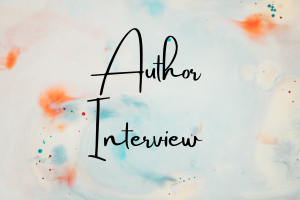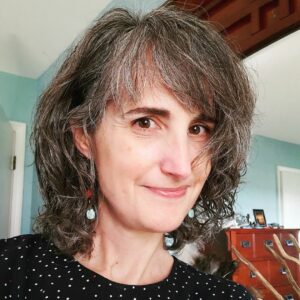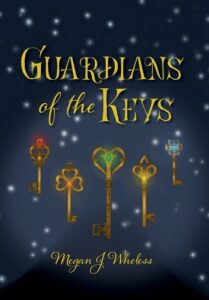Learning about the Human Experience: An Interview with Megan J. Wheless
 Authors come to this series from many different avenues, and one of those ways is via my network. For a few years, I did some freelance editing work for Warren Publishing, and late last year, their marketing director reached out to see if I had an interest in featuring a few authors. Well of course I did, though it’s taken a long time to get to them because I book so far in advance. Long story short, that’s how I came to cross paths with Megan J. Wheless, a Midwestern writer (Midwest represent!) who “infuses her writing with a blend of Midwestern sensibility, magical realism, and genuine tenderness.” Her debut, Guardians of the Keys, released last year, and having read the book, I can attest to the sensibility and tenderness. Readers are clamoring for a sequel—read on to hear more about that—which is something authors want to hear. Just like every other author I interview, Megan leads a full life, so I’m thankful she carved time out of her schedule to answer my questions.
Authors come to this series from many different avenues, and one of those ways is via my network. For a few years, I did some freelance editing work for Warren Publishing, and late last year, their marketing director reached out to see if I had an interest in featuring a few authors. Well of course I did, though it’s taken a long time to get to them because I book so far in advance. Long story short, that’s how I came to cross paths with Megan J. Wheless, a Midwestern writer (Midwest represent!) who “infuses her writing with a blend of Midwestern sensibility, magical realism, and genuine tenderness.” Her debut, Guardians of the Keys, released last year, and having read the book, I can attest to the sensibility and tenderness. Readers are clamoring for a sequel—read on to hear more about that—which is something authors want to hear. Just like every other author I interview, Megan leads a full life, so I’m thankful she carved time out of her schedule to answer my questions.
Christina: Your debut novel, Guardians of the Keys, is magical realism, which you’ve said is a genre you love to write. What other genres call to you? Do any genres exist that you won’t tackle?
Megan: I am also writing more commercial fiction. Some in the book industry, particularly literary agents, would categorize my newest novel, The Adventures of Baba Gannish—about a middle-aged fledgling pet insurance salesman who discovers yoga and transforms his life—as “upmarket fiction” (whatever that means). I have shopped this novel around to literary agents, and one has asked for a full manuscript. I’ve received numerous rejections, but I’m hoping it will land in the right hands soon. I also have ideas for another commercial fiction titled Love in the Mix and have been outlining it and writing scenes in the main character’s voice. I’m still interested in exploring magical realism/fantasy genre and nonfiction later down the line, and I love reading sci-fi and literary fiction, also. One genre that I find interesting to read yet difficult to tackle as a writer is historical fiction and intricate science-fiction. I will continue to read in those genres, but have no desire to tackle them.
Christina: The book is a part of a series. Did you expect to write a series when you first started the book, or did that arise organically? What challenges come with writing a series?
Megan: The idea of a series unfolded organically for me. Many of my readers who loved Guardians of the Keys asked me to write more in that series. A few even expressed they wanted to know more about Daphne and Mildred, the main character Elaine’s great aunts, who are already deceased at the beginning of the novel but whose energy and spirit live on through Elaine’s and other characters’ memories and recollections. That propelled me to explore a “prequel,” which I just finished in the spring of 2023 and am currently workshopping with my writing group. It’s working title is The Book of Secrets, and it follows a younger Daphne and Mildred (in the early 1990s), who must stop a powerful sorceress, and one of their ancestors, Sabine, from getting hold of a prized and secret document special to the Apothecary Guild they were sworn to protect. It’s been so much fun writing this novel, and I know a third and final one in the series will soon follow, and then that will be it.
One of my biggest challenges I’ve encountered with writing the series is keeping details about characters and their specific traits/actions from Guardians of the Keys organized and in alignment with the actions and occurrences in this prequel. And, I struggle with dates and ages of characters, which is why I’m thankful for working with a developmental editor and my writing group and why I won’t tackle historical fiction. 😊
Christina: Is writing a novel something you always planned to do? If so, did anything about the process or execution surprise you?
Megan: Yes, somewhere in the back of my mind I always wanted to write at least one novel; but for nearly 20 years I was teaching high school English, and so I found most of my time devoted to teaching the craft of writing and the art of the novel. Though I attempted novel writing in my free time, there just wasn’t enough time to spare with lesson planning, grading, and all the emotional, mental, and physical energy that goes into being a passionate educator. Plus, my nephew went through a bone marrow transplant when he was 3 (he’s a healthy, strong, and creative 15-year-old now), and a lot of my time was devoted to helping my sister and brother-in-law and my parents take care of him during that journey. My writing during my time as a teacher and a caretaker revolved around documenting my nephew’s health journey, which I blogged about and also wrote news articles for Be the Match Foundation and Barnes-Jewish-Children’s Hospital in St. Louis. And then in 2016, I took a sabbatical from teaching and did freelance writing for organizations such as The St. Louis Audubon Society before moving to the Asheville, North Carolina, area, where I also did freelance writing work and had a few creative nonfiction essays published.
It wasn’t until I met my now husband in 2017 that he encouraged me to write my novel I had been talking about and loosely outlining. I’m so glad he did because the entire process was so much fun and very healing. Some of the beautiful surprises that came out of writing Guardians of the Keys was finding connections to my ancestral lineage on my paternal side in the form of a minor character, Anton (who now plays a larger role in the prequel), and also getting a chance to share sweet and humorous stories about my maternal relatives in the characters of Daphne and Mildred (who were my real life great-aunts). I also found out how much I love the prairies and woodlands of the Midwest, and right as I received the contract from Warren Publishing that they wanted to publish my novel, I had moved back to my home state of Illinois with my husband. So as I did my editing work with Melissa Long of Warren Publishing, I was hiking trails and reconnecting with the flora and fauna that inspired me in my youth. It was a very magical time for me that I feel enhanced my writing and this novel in particular.

Christina: What is your writing process like? Do you have a solid writing practice or routine?
Megan: Overall, my writing process is very organic. Nearly every day I journal by hand in my composition notebook. And I don’t restrict myself on what I write about. Sometimes I vent, other times I do what I call “focused freewriting,” where I write down a question and then set a timer and focus on the question at hand. And other times I simply meditate for 10-15 minutes then write down my reflections afterward.
When it comes down to working or revising one of my novels or a short piece of fiction, I tend to write what has been swimming around in my head while I do other creative tasks like gardening or baking or even hiking. And then I start to see the story unfold and go from there. Usually when I finish a chapter, I spend time outlining the next chapter and then take a break for a day or two then come back to tackling that chapter. Often I find that the next chapter unfolds a little differently than I had outlined it, and it’s like mining for jewels: I’m always excited when I find something I hadn’t expected to be there, and I find a way to fit it in so the story is richer and more exciting.
Once I have at least five chapters written, I go back and read through the earlier ones, make revisions and edits, and then continue on with the story and the chapter-by-chapter outlining that I mentioned previously. For me, it is a combination of structure and organic flow that seems to help unlock themes, character motivation, and richer, deeper prose than I could have had I stuck to a strict outline from beginning to end. Another thing that has been true in the writing of Guardians of the Keys, The Book of Secrets, and The Adventures of Baba Gannish (and also in these formulation stages of Love in the Mix) is that I see the ending of the novel in my mind’s eye, and the challenge is how to get my character/characters to the ending in a satisfying, adventurous, interesting way. It’s like doing a jumbo 1,000 piece puzzle. So fun and frustrating and challenging and exciting all at once.
Christina: Readers love to hear about an author’s journey to publication. Can you tell us a little about yours? How did you choose Warren Publishing?
Megan: When I finished writing Guardians of the Keys in May 2020, I sent it to a few friends and family members for “beta reading.” They gave me really insightful and helpful feedback and I revised twice through before I began the traditional querying process to literary agents. I found the querying process invigorating and definitely a writing journey in and of itself. And after a few weeks to a month, I started getting what I called “good rejection letters.” My husband laughs when I use that phrase, but what I mean by it is that although the agents I queried said “no,” their overall feedback was positive. One woman said she loved the concept but her plate was full so she was going to pass it on to her colleague. Her colleague responded with a similar statement but told me I had something worth pursuing. Another woman said it wasn’t the genre she was the most comfortable with but that the storyline seemed interesting and to keep sending it out. I was also sending out short stories using my online Submittable account and came across Warren Publishing. They said they accepted queries of novels and would offer editorial feedback. I thought “What do I have to lose?” and submitted. Instead of receiving feedback on how to shape it or revise it, I received an offer for an editorial contract. After much discussion with my husband, I decided that going with a hybrid publisher was worth the risk to get my story out to the public. The royalties were/are higher, and in under a year’s time I had sold over 300 books and have been on shelves in Barnes & Nobles and independent bookstores across the Midwest, which I deem a success by any standard.
Christina: What’s your favorite part about writing/being an author? What do you find challenging?
Megan: My favorite part of being a writer is the discovery of the story and stretching my imagination and my writing abilities and learning what I’m capable of creating and accomplishing. It is so much fun to be immersed in a world that you’re creating (or should I say co-creating with some force/muse other than yourself because I can’t always explain where the ideas and inspiration come from). And I learn about the human experience and about life’s challenges and joys through my characters’ challenges and joys. I have been writing ever since I was ten years old, and I don’t see myself ever quitting, whether I get published again or not. Which leads to the most challenging aspect of being a writer: the rejection.
I have been cultivating a healthy relationship with rejection these past few years thanks to reading Elizabeth Gilbert’s nonfiction book on creativity titled Big Magic: Creative Living Beyond Fear. I remind myself that the act of creation is more important than the end product. That engaging with your imagination and dancing with creativity is a soulful act that leads you to a richer life if you just accept that it is your divine right as a human being to create. The rest—publication, having an audience, getting a positive review, etc.–is just the icing, sprinkles, and cherries on top. The real joy comes from saying “Yes” to creating something unique and new to you and eventually the person or people you choose to share it with.
Christina: In your website FAQs, you write about Elaine, the protagonist of Guardians of the Keys: “I wanted a strong-minded female character who needs to confront her limited perspective on how she believes her life should be unfolding.” That’s something we all need, don’t you think? Why was this important to you?
Megan: For me, the most interesting characters in literature are those who are flawed and struggle with their limiting perspective or isolated beliefs and their bravery to confront these limitations at some point during their journey. And honestly, I think that’s what we all must do in life. In my writing group, we were helping one of our members brainstorm themes for her upcoming novel, and she landed on the idea of her character discovering who she is without anyone’s help. And I remember saying to her, “Unless your character lives in a vacuum, no one, in literature or in life, can learn about who they are without interacting with others and encountering conflict, tension, or differences of opinion.” And certain characters in Guardians of the Keys—especially Adele, who is old enough to be Elaine’s mother and was best friends with Elaine’s great aunts—challenge Elaine to face herself and her limited beliefs. And by the two of them “butting heads” a few times and Adele ruffling Elaine’s feathers so to speak, Elaine begins to see that maybe she was wrong, and maybe there is more to uncover about her life and herself and ultimately her purpose/goal in life. By the end of the novel, Elaine has softened and opens up to the idea that life is a beautiful mystery and better explored with people who are willing to engage in the unknown with you and bring their special gifts along for the ride as well. Magic isn’t always a wand and an incantation. It can be the surprise, the beauty, the nudge of intuition, or the clues revealed when your heart and mind are open to other possibilities.
Christina: I love finding little nuggets of writerly wisdom that authors provide on social media. In one of your IG posts, you wrote, “For those of you pursuing your love of the creative arts, keep going. Learn to say ‘Yes’ to your own work.” Exactly! But that’s easier said than done. Do you have any tips for how writers and other artists can do that?
Megan: For me, saying “Yes,” to your own work is showing up and agreeing to engage with your creative side time and again because you’re interested in knowing what happens next, even if your work falls short or doesn’t hit the mark on any given day. Keep saying “Yes,” and keep trying, and ultimately you will start finding little puzzle pieces and gems that reflect who you are as a writer/creator. If you write (or paint, or sing, or play music, or dance, etc.) for an imagined audience to come, you’re already limiting yourself and setting yourself up to become pigeonholed or, worse cutting yourself off from discovering these hidden gems where characters do or say something that propels them to an interesting realization, or where the story takes a more in-depth, more organic turn that reveals deeper layers of the plot and/or theme.
Saying “Yes” to your work means you first and foremost create for yourself and for the joy of creating. That way, when rejections start rolling in as you search for the “yes” that will lead you to publication, you have all of those memories, experiences, and knowledge along with new skills and ideas that are unique to you and you alone simply because you agreed to engage in the creative process in the first place. No one can take those special moments away from you. That to me is the ultimate success story.

Megan can be found in multiple places!
Website: https://meganjwhelesswriter.com/
Instagram: @megan_wheless_writer
Facebook: @megan.hoelscher
Thanks to Megan for agreeing to this interview! If you know of an artist, author, or podcaster who’d like to be featured in an interview (or you are an author who would like to be featured), feel free to leave a comment or email me via my contact page.
